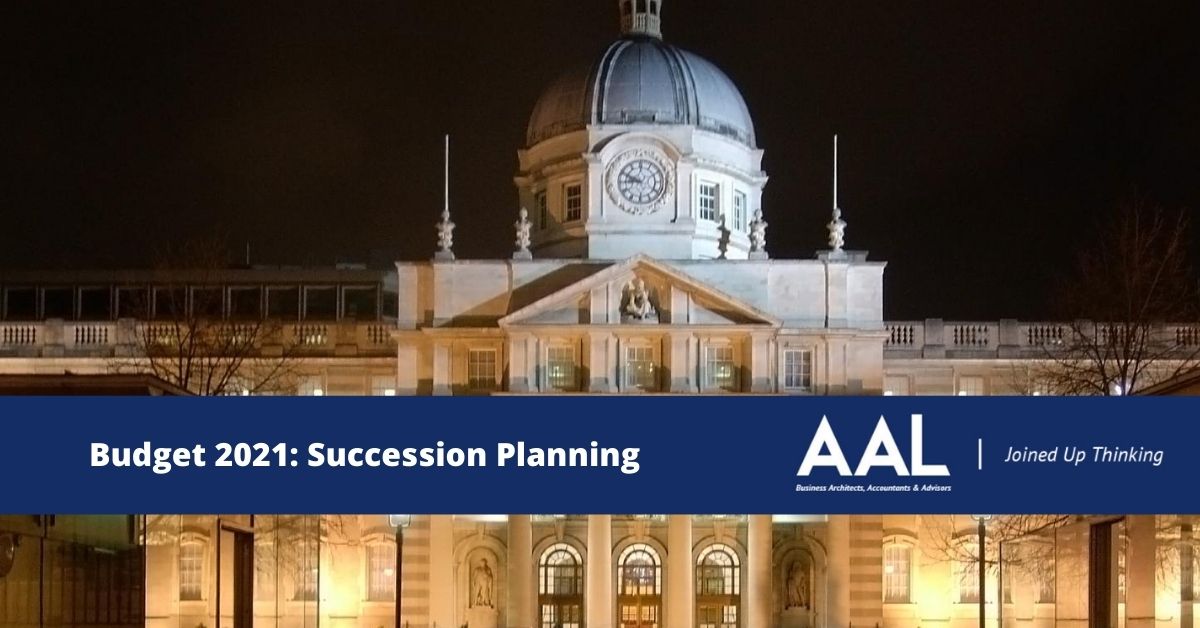Our final topic in our pre-budget series looks at the issue of business succession. If 2020 has done anything, it has caused many of us to pause and consider where we are with our businesses and careers. For many of us, that has led to a decision to pass the business on to a family member or a trusted business partner. However, doing so might not have ben as easy as you might have liked or it might be something that is preventing you from taking the step away from your business.
This article looks at the possible supports that the Government might introduce to enable entrepreneurs to put in place a business succession plan that will enable a smooth and worthwhile transition to the next generation.
It is widely felt that the Great Recession beginning in 2009 caused many business owners to stay in their businesses far longer than they might previously have expected. In some cases, they might not have stepped away, years after the downturn ended. Therefore, there needs to be a package of supports or incentives to enable entrepreneurs to step away from their businesses without incurring significant costs or penalising them for doing so.
Some of the measures that could be introduced include:
- Introducing a similar system to that in the UK, where the 90% cap is removed and that full relief is granted under Capital Acquisitions Tax.
- Removing anomalies on Capital Gains Tax Retirement relief. The scheme has several anomalies and ensuring consistency and an easy to understand system would avoid confusion for entrepreneurs.
- Remove the retirement relief cap on the transfer of shares for those aged 66 years or older.
Of course, business succession is an area fraught with practical and emotional issues for all concerned. Budget 2021 has the opportunity to introduce measures that would facilitate an easier transition of businesses between generations of families while ensuring that the entrepreneur is not penalised for exiting the business.
Budget 2021 will be delivered by both Ministers Donohue and McGrath in October 2020. It will be keenly watched as the Government has to navigate the difficulties of an economy battered by Covid-19 related restrictions and to put in place incentives to encourage demand in the Irish economy. Added to that, there is the extra spectre of Brexit to consider as the UK is due to leave the EU entirely on December 31st, 2020.
Budget 2021 Series
You can read our previous articles from our Budget 2021 series, below.
Budget 2021: Cashflow & Tax Relief for Businesses
Budget 2021, to be delivered by the Irish Government in early October will be the most keenly awaited budget for a generation. The unprecedented nature of the pandemic and the demands placed upon the exchequer for the the healthcare system, business supports, the pandemic unemployment payment and the TWSS/EWSS has cast the budgetary process into disarray. Now, as the country battles with rising rates of Covid-19 infection, the respective finance Ministers (Pascal Donohue and Michael McGrath) are tasked with delivering measures that shore up public finances while energising the Irish economy. In this, the third article in our pre-budget series, we look at the cashflow and tax relief measures that might be introduced in Budget 2021. As is now common place, many of the measures listed below have been leaked/briefed to journalists in the weeks ahead of the budget in an attempt to prepare the public for what is to be announced.
Budget 2021: Maintaining Employment
The Covid-19 pandemic has had a catastrophic on the Irish employment market. To put this into perspective, let us look at unemployment rates in Ireland in April 2019 and in April 2020. April 2019 saw an unemployment rate of 5.4%, while the rate in April 2020 was a staggering 28.2% (Ref: CSO. Link here). Since the easing of lockdown measures, the Government has rolled out many schemes to get as many people back to work as is possible. However, that mobilisation of the workforce has been hampered by rising case numbers and local lockdowns in the case of Kildare Laois, and Offaly.
Budget 2021: Financial Supports for SME’s
Budget 2021, due to be delivered in October 2020, will be keenly watched by entrepreneurs and owners of small to medium enterprises in Ireland. The sector has been severely impacted by the measures implemented to stem the spread of Covid-19. In particular, sectors such as retail, hospitality, and tourism have experienced catastrophic losses as a result of closures and restrictions implemented since March 2020.




